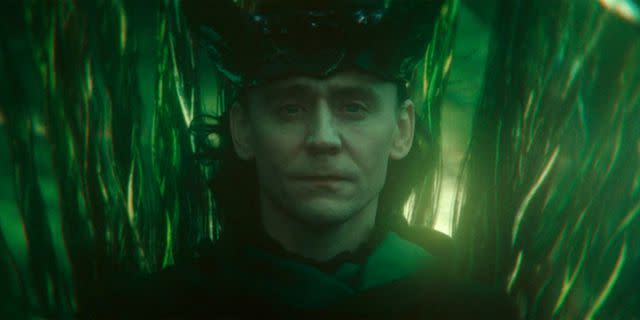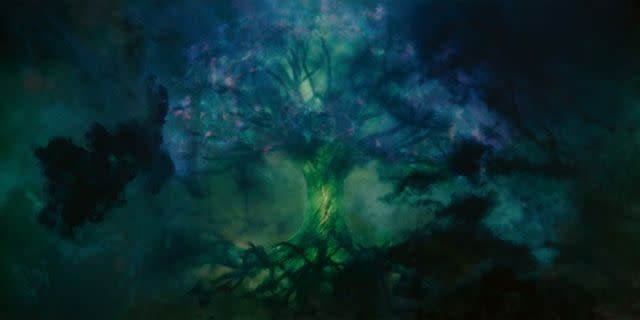Tom Hiddleston suggested that emotional “Thor ”callback in the “Loki ”season 2 finale
- Oops!Something went wrong.Please try again later.
- Oops!Something went wrong.Please try again later.
Executive producer Kevin Wright breaks down the show's mind-bending conclusion — and whether this really is the end for everyone's favorite time-traveling god of mischief.
Warning: This story contains spoilers for the Loki season 2 finale, "Glorious Purpose."
Loki ends with its titular god claiming his throne — just not the one he expected.
The Marvel Disney+ show concluded its second season this week, seemingly saying goodbye to Tom Hiddleston's Loki. In an effort to stop the universe from collapsing in on itself, Loki learns to control his "time-slipping," using it to go back further and further in time. With help from Sylvie (Sophia Di Martino), Mobius (Owen Wilson), and O.B. (Ke Huy Quan), he tries again and again to fix the TVA's temporal loom and prevent a meltdown. But every time he goes back, he fails, and he spends literal centuries reliving the same events over and over.
Eventually, Loki admits defeat and chooses to sacrifice himself to save every universe. Walking toward the temporal loom, he grabs the very fabric of space-time and uses it to build a throne of his own, weaving the threads together to create a tree. (It's a nod to the legendary world tree Yggdrasil from Norse mythology.) With that, Loki essentially crowns himself master of the multiverse, watching over every timeline as a lonely god. It's the ultimate selfless act from one of Marvel's most notorious villains — a villain who once sicced an alien invasion on New York to get his dad's attention.
Here, executive producer Kevin Wright breaks down the series' emotional finale — from the throwback line that Hiddleston improvised to whether this is really the end for Loki.

ENTERTAINMENT WEEKLY: When did you decide this was how you wanted Loki's story to end?
KEVIN WRIGHT: I think we knew in season 1. Once we were going to do a season 2, we knew that Loki would end up on the throne. That was always the easy thing. The question was: How do you want that to feel for the audience? There's a version that's triumphant and super heroic. There's a version where it's an evil turn. But it was always about the emotional journey we wanted people to go on. It was about building that journey to be as cathartic as possible and to feel like a payoff for six movies and 12 episodes over 12 years with this guy. It was always about building that arc to be as fulfilling as possible.
Most of the episode is dedicated to this sort of time loop, where we see Loki trying over and over again to get things right and fix the loom, almost in a Groundhog Day kind of situation. What was fun about getting to do that endless loop?
Even in season 1, we always wanted to do a Run Lola Run thing, but there was never space for it. So once we started going into loops this season in the writing process, we thought, "Oh, let's finally do it." So much of that is total credit to Paul Zucker, the editor of the episode. That montage wasn't scripted per se. We knew Loki was going to be rerunning things, but it wasn't written exactly the way that it played.
A really fun thing, though, was that our cast — outside of Tom — had no idea what we were doing. They understood that he was rerunning time, but we shot a very different ending to episode 4 that was not the real ending. All the cast thought something very different would happen. We would send them away on lunch breaks, and Tom would take his lunch later, and he would just keep shooting with [directors Justin Benson and Aaron Moorhead] with a skeleton crew. There were very few people that fully understood what we were building in that finale. So, for that core team, I think there was a lot of satisfaction when everybody was able to sit down and see how it came together. It just felt like this little secret.

What do you remember most about watching Tom film those final scenes?
Two moments really jump to mind. The first is a little bit of a longer story. There's the scene with He Who Remains, and that was scripted one way. We had this fear, like, "Is this going to feel like we're retreading the same ground as season 1?" Would it be fulfilling? We started shooting one day, and anybody in any creative field will understand this: There are days where the words are right, they way you're doing it is right, but it's just not adding up. Something was missing. We knew we weren't nailing it, and I had to make the call. That is really scary, when your first AD just wants to keep moving, and I said we were going to stop shooting.
Tom went and sat down with our script supervisor and basically did this insane crash course in 30 minutes of every line that had been said on the whole series. Then, he went for a run around the lot at Pinewood [Studios], and when he came back, he was like, "I know what this needs to be now." Then, he and Jonathan worked out what it was going to be, and they sat down with Justin and Aaron and me and Katie Blair, our production writer. They just quickly rewrote this new scene and shot it. It was just the pinnacle of what Tom does. He has such a finger on the pulse of this entire series and how that scene had to go. In a moment, he was able to reconfigure it with all of our collaborators.
The other thing is that final line before he steps out toward the loom, which is the Thor line, which was not scripted. Right before we were going to shoot that, Tom came and pitched it to me, like, "Should we do this?" We were like, "God, why did we not write that?" It was perfect, and it was 100 percent Tom.
I wanted to ask about that line, where Loki turns to Sylvie and Mobius and says he has to do this "for you, for all of us." It's a direct throwback to one of his lines in the original 2011 Thor. So that was a Tom Hiddleston improvisation?
It was 100 percent Tom. We had already done a few takes of the first part of that line, which was, "I know what kind of god I need to be." And on the final take, Tom said, "Hey, can I try this?" As soon as he said it, all of us were like, "This is going to be the take." It almost gave me Truman Show vibes, that final sign-off, looking straight down the camera. But that story gets to the heart of how Tom is always trying to make things better. We just had to build a series that could give him the framework to have those creative pivots. Everyone would just kind of throw their hands up and say, "Geez, this is why this guy is fantastic."
With Loki in charge of the multiverse, this could affect how (and if) we might see Jonathan Majors' Kang the Conqueror in future Marvel projects. For you, where does this finale leave Kang and his future in the MCU?
I'm going to tread probably infuriatingly lightly, but for me — and I know all the filmmakers agree — we think everything is there on screen. I think all the details are there, and there is a lot that people haven't picked up on, or haven't fully understood what is being said. The key to the future is in that conversation with Sylvie, and this doesn't necessarily undo any of those threats. In my mind, it's what Sylvie said: "At least give us a chance. Let us fight that battle for ourselves and define our own destiny."

I also wanted to ask about that final shot of Mobius in Ohio, where he's standing there silently, watching time pass. Why was that the right ending for Mobius?
In the big picture of the show, we wanted this to feel like a real ending. We wanted to give closure on a number of things, and we didn't want to do anything that felt like it was just teeing up a new story. But you could plant new seeds that could become new stories. My feeling with that scene in Ohio is that it's Mobius overcoming a personal obstacle. He just had to go and look. The show is not telling you whether he's going to stay there, or whether he's going to go back to the TVA. I think both are possibilities. But the important thing was the character growth of him going to do the thing he has been avoiding. I think it took what Loki did to cause Mobius to go, "I have this opportunity. This opportunity was given to me by Loki. The least I can do is go."
So that being said, is this the end for Loki? Is this a season finale, or is it a series finale?
I'm thinking of it kind of like a comic run, and this is the end of that comic run. I know [head writer Eric Martin] has said this a lot: These two seasons were two chapters of the same book, and we wanted to close the book. That was a challenge from Owen in between seasons: He was like, "Nobody has the courage to close the book! Let's close the book!"
Again, I speak for myself and not Marvel, but I am certainly pitching ideas of where I could see certain stories going. I think there are a lot of stories you can tell at the TVA, and we are just scratching the surface on that. I would love to see more stories with Loki, and I think Tom would continue to play this character until he is Richard E. Grant's Classic Loki [laughs]. But I don't think that means you need to have this story every year or every two years. It's about doing it when we have a good story to tell. I would love to keep working with these filmmakers.
We built a really awesome team, and if Loki is Breaking Bad, maybe there's a way for this team to keep telling stories with our version of Better Call Saul — whether that's with Sylvie, with the TVA, or with a new Loki. But we only want to do that if we have the right story and it can be just as fulfilling as this one. After all, you can't be the God of Stories if you're not going to tell more stories.
This interview has been edited for length and clarity.
Sign up for Entertainment Weekly's free daily newsletter to get breaking TV news, exclusive first looks, recaps, reviews, interviews with your favorite stars, and more.
Related content:
Watch Tom Hiddleston address Loki's potential ability to bring Tony Stark back from the dead
Loki director Kate Herron reveals how Tom Hiddleston helped shape that finale kiss
Read the original article on Entertainment Weekly.

